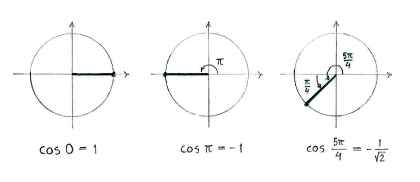Lösung 2.1:4a
Aus Online Mathematik Brückenkurs 2
K |
|||
| (Der Versionsvergleich bezieht 5 dazwischen liegende Versionen mit ein.) | |||
| Zeile 1: | Zeile 1: | ||
| - | + | Zeichnen wir die Funktion <math>y=\sin x</math>, sehen wir, dass die Funktion bis <math>x=\pi </math> oberhalb der ''x''-Achse liegt und danach unterhalb. | |
[[Image:2_1_4_a1.gif|center]] | [[Image:2_1_4_a1.gif|center]] | ||
| - | + | Die Fläche vom Gebiet zwischen <math>x=0</math> und <math>x=\pi</math> ist deshalb | |
| - | {{ | + | {{Abgesetzte Formel||<math>\int\limits_{0}^{\pi} \sin x\,dx</math>}} |
| - | + | während die Fläche vom restierenden Gebiet | |
| - | {{ | + | {{Abgesetzte Formel||<math>-\int\limits_{\pi}^{5\pi/4} \sin x\,dx\textrm{,}</math>}} |
| - | ( | + | ist (beachte das Minuszeichen). |
| - | + | Die gesamte Fläche ist also | |
| - | {{ | + | {{Abgesetzte Formel||<math>\begin{align} |
& \int\limits_{0}^{\pi} \sin x\,dx - \int\limits_{\pi}^{5\pi/4} \sin x\,dx\\[5pt] | & \int\limits_{0}^{\pi} \sin x\,dx - \int\limits_{\pi}^{5\pi/4} \sin x\,dx\\[5pt] | ||
&\qquad\quad {}= \Bigl[\ -\cos x\ \Bigr]_0^\pi - \Bigl[\ -\cos x\ \Bigr]_\pi^{5\pi/4}\\[5pt] | &\qquad\quad {}= \Bigl[\ -\cos x\ \Bigr]_0^\pi - \Bigl[\ -\cos x\ \Bigr]_\pi^{5\pi/4}\\[5pt] | ||
| Zeile 24: | Zeile 24: | ||
\end{align}</math>}} | \end{align}</math>}} | ||
| - | + | Hinweis: Die exakten Werte von <math>\cos 0</math>, <math>\cos \pi </math> und <math>\cos (5\pi/4)</math> können wir durch den Einheitskreis erhalten, indem wir die Winkeln <math>0</math>, <math>\pi</math> und <math>5\pi/4</math> einzeichnen und deren ''x''-Koordinaten ablesen. | |
| - | + | ||
[[Image:2_1_4_a2.gif|center]] | [[Image:2_1_4_a2.gif|center]] | ||
Aktuelle Version
Zeichnen wir die Funktion \displaystyle y=\sin x, sehen wir, dass die Funktion bis \displaystyle x=\pi oberhalb der x-Achse liegt und danach unterhalb.
Die Fläche vom Gebiet zwischen \displaystyle x=0 und \displaystyle x=\pi ist deshalb
| \displaystyle \int\limits_{0}^{\pi} \sin x\,dx |
während die Fläche vom restierenden Gebiet
| \displaystyle -\int\limits_{\pi}^{5\pi/4} \sin x\,dx\textrm{,} |
ist (beachte das Minuszeichen).
Die gesamte Fläche ist also
| \displaystyle \begin{align}
& \int\limits_{0}^{\pi} \sin x\,dx - \int\limits_{\pi}^{5\pi/4} \sin x\,dx\\[5pt] &\qquad\quad {}= \Bigl[\ -\cos x\ \Bigr]_0^\pi - \Bigl[\ -\cos x\ \Bigr]_\pi^{5\pi/4}\\[5pt] &\qquad\quad {}= \Bigl( -\cos\pi - (-\cos 0)\Bigr) - \Bigl( -\cos\frac{5\pi}{4} - (-\cos\pi) \Bigr)\\[5pt] &\qquad\quad {}= \Bigl( -(-1)-(-1) \Bigr) - \Bigl( -\Bigl(-\frac{1}{\sqrt{2}} \Bigr) - \bigl(-(-1)\bigr)\Bigr)\\[5pt] &\qquad\quad {}= 1+1-\frac{1}{\sqrt{2}}+1\\[5pt] &\qquad\quad {}= 3-\frac{1}{\sqrt{2}}\,\textrm{.} \end{align} |
Hinweis: Die exakten Werte von \displaystyle \cos 0, \displaystyle \cos \pi und \displaystyle \cos (5\pi/4) können wir durch den Einheitskreis erhalten, indem wir die Winkeln \displaystyle 0, \displaystyle \pi und \displaystyle 5\pi/4 einzeichnen und deren x-Koordinaten ablesen.


